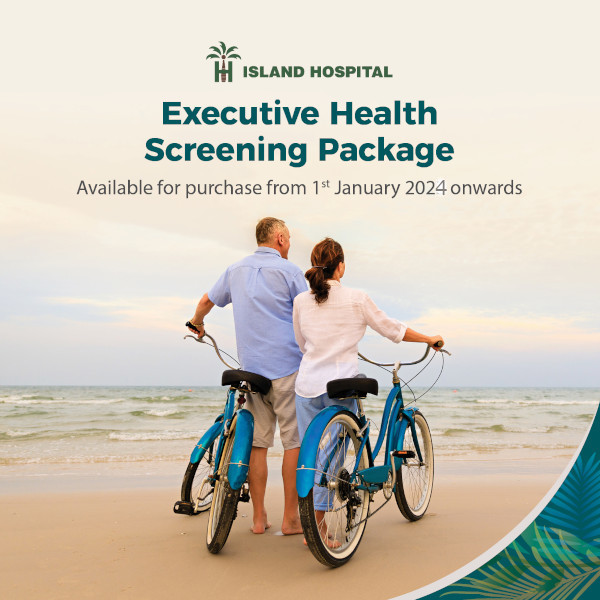
20 May Hypertension – the silent killer you need to know
Hypertension – the silent killer you need to know
By Island Hospital | May 20, 2025 10:34:08 PM
The symptoms of hypertension, also known as high blood pressure, typically appear too late. It develops gradually over time and can be linked to various causes.
Unfortunately, many people with high blood pressure are unaware that they have it, even though this condition can be effectively managed through lifestyle changes and medication when necessary.
Here are the key facts you should know about hypertension
Know your Blood Pressure that Puts you at Risk of Hypertension
Blood pressure is considered high if the upper value (the systolic value) is 140 mmHg or more, or the lower value (the diastolic value) is 90 mmHg or more.
Hypertension, or high blood pressure, refers to the condition in which blood is pumped throughout the body at an excessively high pressure.
Blood pressure is not constant throughout the day. It fluctuates based on the time of day or night, exercise, excitement, or stress. Due to this normal variation, it is important to measure blood pressure multiple times on different occasions.
High blood pressure is a common condition in which the long-term force of blood against your artery walls is high enough to cause health problems, such as heart disease.
Blood pressure is determined by the amount of blood your heart pumps and the resistance to blood flow in your arteries. The more blood your heart pumps and the narrower your arteries, the higher your blood pressure.
What Causes Hypertension?
In 95% of cases, the cause of hypertension is unknown. In 5% of cases, hypertension may be due to factors such as kidney disease, narrowing of specific blood vessels, or hormonal imbalances.
Obesity, diabetes, smoking, excessive consumption of salt and alcohol, physical inactivity and frequent psychological stress are risk factors that increase the chance of developing hypertension.
Know the Signs and Symptoms of Hypertension
Hypertension is often called the ”silent killer.” Even when severe, it may not present any symptoms.
Occasionally, you might experience headaches or dizziness when hypertension is severe. However, these symptoms are not exclusive to hypertension; they can also occur in other diseases.
Hypertension is sometimes only discovered when complications arise, such as a stroke or heart attack.
Is your heart at risk? Learn how to manage high blood pressure with expert-backed tips
Complications from Hypertension
Hypertension increases the risk of developing atherosclerosis (the hardening and narrowing of the arteries). If left untreated or inadequately treated, hypertension can lead to the following problems:
- Coronary heart disease
- Heart failure
- Stroke
- Peripheral artery disease (narrowing of the blood vessels in the limbs)
- Kidney failure
The risk of suffering from hypertension complications increases in people who:
- Smoke
- Are overweight (BMI of 23 kg/m² or higher)
- Have high blood cholesterol
- Suffer from diabetes mellitus
Crucial Signs of Heart Attacks and Strokes
Heart attacks and strokes are common emergencies associated with hypertension and can be life-threatening. It is crucial to recognise the signs of a heart attack or stroke if you have hypertension.
Signs of an impending stroke include slurred speech and blurry vision. If you start to experience these symptoms, or if someone around you notices that you are behaving strangely, you should contact emergency services immediately.
The signs of a heart attack may differ for men and women.
Men often experience chest pressure, nausea with or without vomiting, and cold or clammy skin. Women, more often than not, report sudden-onset shortness of breath, with or without chest pressure, general fatigue, and nausea (with or without vomiting).
If you want to learn how heart attacks occur in women, read more in our article on Heart Attack in Women.
How is Hypertension Treated?
Lifestyle modifications serve as the foundation for treating hypertension and other metabolic diseases. Frequently, weight loss, exercise, reduced salt intake, quitting smoking, and limiting excessive alcohol consumption are sufficient to control blood pressure.
When lifestyle changes do not help control blood pressure, anti-hypertensive medications may be prescribed. Even while taking medication, a healthy lifestyle should be maintained.
Appropriate treatment for high blood pressure is known to reduce mortality rates from strokes and coronary heart disease.
Anti-hypertensive Medications to Treat Hypertension
If you have been diagnosed with high blood pressure (hypertension), you will most likely be prescribed medications from these five main groups:
- Diuretics
- Beta-blockers
- Calcium channel blockers
- Angiotensin-converting enzyme inhibitors
- Angiotensin II receptor blockers
Medication prescriptions are individualised based on the person’s age, sex, and coexisting medical conditions.
More than one drug may be prescribed to maintain blood pressure (BP) at an acceptable level. Single drugs that combine medications from two of these groups are also available.
Want more tips to maintain your blood pressure within a normal range? This article on ways to reduce blood pressure can completely guide you!
Important Things to Remember if you are on Anti-hypertensive Drugs
Treatment is lifelong (involving lifestyle modifications with or without medications). Medications should not be stopped or changed in dosage without consulting a doctor.
Regular blood pressure measurement and follow-ups with the doctor are essential for effective control of blood pressure. More frequent home monitoring using an electronic blood pressure monitor will contribute to better management.
Dos and Don’ts if you Have High Blood Pressure (Hypertension)
When you’re experiencing high blood pressure, it is important to take these measures carefully. Here are some dos and don’ts:
- Do control your weight to keep your BMI below 23kg/m2, but not below 18.5kg/m2. Reducing excess weight can help lower total cholesterol, LDL cholesterol, and triglyceride levels.
- Do maintain a regular healthy diet by limiting your intake of all types of fats. Try to replace saturated fats with unsaturated fats.
- Do limit cholesterol intake. Major sources include organ meats (e.g., liver, brains, kidneys, intestines, and heart), egg yolk, squid, fish roe, shellfish, prawns, crabs, and animal fats.
- Do increase fibre intake. Fibre is found in oats, oat bran, barley, fruits, vegetables, legumes and whole grains and can speed up the removal of cholesterol from the blood.
- Do exercise for at least 30 minutes for 5 or more days per week. A lack of exercise is associated with low levels of HDL cholesterol (good cholesterol).
- Do limit alcohol intake to no more than 2 standard drinks per day. That is equivalent to two-thirds of a small can of beer (220 ml), one glass of wine (100 ml), or one nip of spirit (30 ml).
- Do not smoke.
If you have any questions regarding the diagnosis or treatment of hypertension, please don’t hesitate to contact us.
Never Let Hypertension Go Unnoticed — Manage Your Blood Pressure Now
Often dubbed the silent killer, hypertension should not be taken lightly, as leaving it untreated can lead to serious complications such as kidney damage, stroke, or even a fatal heart attack.
The good news? You can maintain normal blood pressure and protect your overall health with proper and effective treatment.
At Island Hospital, our friendly cardiology experts are committed to providing you with the best treatment that’s tailored to your comfort and needs. Your health is our top priority.
If you’re exploring your options, we’re here to support you every step of the way! Enhance your well-being by booking a consultation with our cardiologists today.
If you have any questions or concerns, please don’t hesitate to contact us.
Early Detection Saves Lives — Start Your Journey To Better Health

We’re offering our Executive Health Screening Package at only RM760 – giving you a complete head-to-toe health assessment for peace of mind.
Our package includes vital health screenings, such as Lipid Profile, Radiological Screening, Cardiovascular Assessment, Urine Assessments, and more.
What’s Included in Your Screening Experience:
✔ Physical examination
✔ Complete medical report
✔ Consultation by Health Screening Physician/Specialist
✔ Choice of light refreshments
✔ Exclusive Island Hospital woven bag








